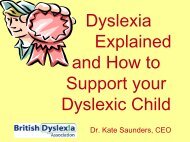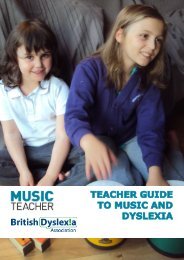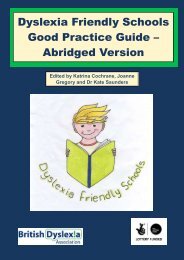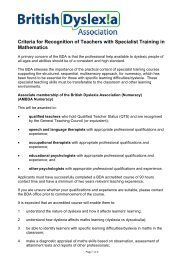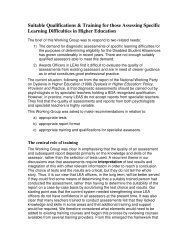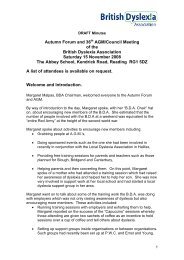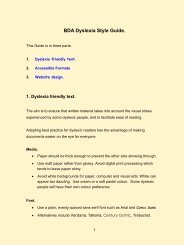Intervention for Dyslexia - The British Dyslexia Association
Intervention for Dyslexia - The British Dyslexia Association
Intervention for Dyslexia - The British Dyslexia Association
You also want an ePaper? Increase the reach of your titles
YUMPU automatically turns print PDFs into web optimized ePapers that Google loves.
5.5.2 Key Stage 1 results of Reading Recovery children in England, 2003– 07<br />
A key conclusion in reports published by ECaR is that evidence from National Curriculum<br />
assessments in reading and writing at the end of their second year of <strong>for</strong>mal schooling<br />
indicates that Reading Recovery not only raises children’s literacy standards but also<br />
puts children ‘on track’ <strong>for</strong> becoming independent readers:<br />
“<strong>The</strong> programme has demonstrated that providing Reading Recovery is an effective<br />
solution to early literacy difficulties. Over three quarters of the children involved – the<br />
hardest to teach children in the schools where it is hardest to raise standards – have<br />
been returned to average or above literacy levels <strong>for</strong> their age after only 41 hours of<br />
one-to-one teaching.” (ECaR, 2008, p.54)<br />
Reading Recovery reports often use achievement of Level 2 or above in Key Stage 1<br />
National Curriculum assessments in reading and writing as a ‘benchmark’ to demonstrate<br />
that Reading Recovery has enabled children to become independent readers:<br />
“In national curriculum terms, the children moved from a level ‘W’ (working towards<br />
National Curriculum Level 1) to Level 1A. Level 1A would put them well on track <strong>for</strong><br />
achieving Level 2+ (the nationally expected benchmark) at the end of Key Stage 1,<br />
when they are seven.” (ECaR, 2008, p.12)<br />
“Almost three out of four children who received Reading Recovery attained level 2 or<br />
above in National Assessments <strong>for</strong> reading (71.6%), and two out of three <strong>for</strong> writing<br />
(60%). This included children who did not achieve the goals of the programme, and<br />
those who received RR in Y2 and were still part way through their series of RR lessons<br />
when National Assessments took place. Children who achieved the goals of Reading<br />
Recovery had an even greater likelihood of success in National Assessments, with 17 out<br />
of 20 (83%) reaching level 2 or above in reading and 14 out of 20 (69%) in writing.”<br />
(Douëtil, 2007a)<br />
Presenting the results in this fashion may lead to the (erroneous) assumption that all<br />
three sublevels of Level 2 are equivalent in terms of the likely prognosis <strong>for</strong> children’s<br />
continuing successful progress in reading (Level 2+ is described in the second quote<br />
above as “the nationally expected benchmark”). However, level-by-level comparisons to<br />
all-England samples presented below <strong>for</strong> 2006 and 2007 reading National Curriculum<br />
assessments challenge conclusions drawn from these ‘headline’ figures.<br />
Figure 5 shows the figures from the Annual Reports on Reading Recovery compiled at<br />
the Institute of Education <strong>for</strong> the years 2002–03 to 2006–07, i.e. the percentage of<br />
Reading Recovery ‘accelerated progress’ children who completed their Reading Recovery<br />
programme and reached the criteria <strong>for</strong> discontinuation who went on to achieve Level 2<br />
or above in Key Stage 1 National Curriculum assessments in reading and writing. It can<br />
be seen that the reading results are consistently better than the writing results – as,<br />
indeed, they are nationally.<br />
Per<strong>for</strong>mance profiles of ‘accelerated progress’ children and all children who completed<br />
Reading Recovery programmes in Key Stage 1 reading National Curriculum assessments<br />
are shown in Figure 6 (2003-04), and Figure 7 (2004-05) (data from Douëtil, 2004,<br />
2005).<br />
<strong>Intervention</strong> <strong>for</strong> <strong>Dyslexia</strong> 111



